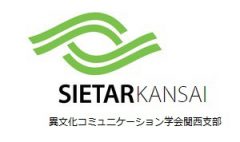Society for Intercultural Education, Training and Research
April 2015 — Special Double-session Program
Date: April 18 (Saturday) 14:00 pm-17:30 pm
Presenters: Stephen Shrader, Kansai Gaidai University
Nobue Maeda, teacher, private language school
Venue: Takatsuki Shiritsu Sogo Shimin Koryu Center, Takatsuki
(1 minute walk from JR Takatsuki Station) Tel. 0726-85-3721
http://www.city.takatsuki.osaka.jp/db/kurasu/images/koryu.gif
Fee: Free for members and students; 500 yen for non-members
Language: English
Social: Dinner after the session at a Thai/Balinese restaurant
Reservations for dinner required by April 15.
Contact fujimotodonna@@gmail.com
Note: No prior registration required to attend the session
Description of presentation 1:
Meeting Mustafa: Experiencing Deep Difference
He is Mustafa, and he does not speak your language. He is friendly–at least he intends to be–but his values and norms are different from yours, and he expects everyone should know “common sense.” Mustafa visited my English class in 2012, and again in 2014. “He” is me–a character I enact for my students–to give them a kind of real life encounter with differences based on abstract concepts covered in my intercultural communication-based English course.
As interculturalists, we know the exhilaration and exhaustion that can come from an intense encounter with someone very different from ourselves, especially when we do not have a language in common, but are pressed to interact with the person in front of us. These are feelings we do not get from the study of abstract concepts and theories if they are divorced from experience, and not easily captured in a textbook or lecture, or even in film, where the people are on screen and a step away from us. Simulations can be a good way to provide experiential learning, but sometimes even a popular simulation can fall flat for a particular group of students. The Mustafa character was born out of my attempt to give my students–even those who have been abroad–an encounter with someone truly “different”.
In this interactive session, inspired by simulations such as The Albatross and Barnga, Mustafa will talk with the audience in his language, following his own norms. Naturally, no one is expected to come in knowing about Mustafa’s “culture” or language, but he works from the ethnocentric assumption that his “common sense” is universally known. After this experience we will discuss the audience reactions to the Mustafa character, how his visit fits into a course, and more generally audience experiences with the use of simulations in teaching.
Profile of Presenter 1:
Stephen Shrader is Associate Professor at Kansai Gaidai University, Nakamiya campus, where he teaches English in the Intensive Studies Program. His courses typically include a range of topics from the field of intercultural communication. He holds an MA in language teaching from the School for International Training. He is a member of JALT and LiDi (Living Within Diversity) SIETAR SIG.
Description of presentation 2:
Let’s Enjoy English and Culture: Cultivating a Community of Diversity
This workshop focuses on English and culture in order to cultivate a community of diversity. When disaster comes, people in a community are forced to help each other. However, it is necessary for them to be able to communicate both directly and logically in Japanese and practical English in order to help each other.
Through experience facilitating 90-minute workshops in the NPO Higashinada Community Tasukeai Network to community members who range from junior high school students to people in their 80s, the facilitator has developed several practical community-building activities. Participants learn to introduce themselves clearly and discuss various topics. They discuss cultural conflict scenarios, such as communication differences between Americans, Thai, Germans, Chinese, Koreans, and Brazilians. Participants enjoy learning easy practical English conversation, including greetings, small talk, conversation ice breakers, compliments, etc. These workshops help Japanese beginners of English improve their English skills.
Profile of Presenter 2:
Nobue Maeda is an educator and researcher of English and intercultural communication. She received an MA in TESOL from Arizona State University, and has taught at Davis High School in Washington state, at Edmonds Community College in Kobe, and Nagoya Meitoku Junior College. She currently teaches at a private school, Let’s Study English and Culture. She has been facilitating English and intercultural communication workshops for the NPO Higashinada Community Tasukeai Network.
